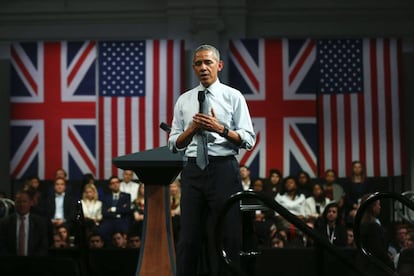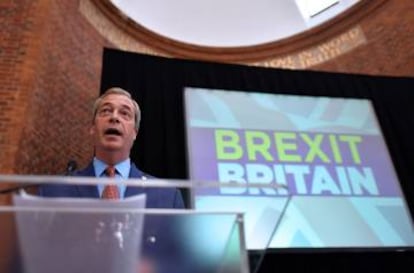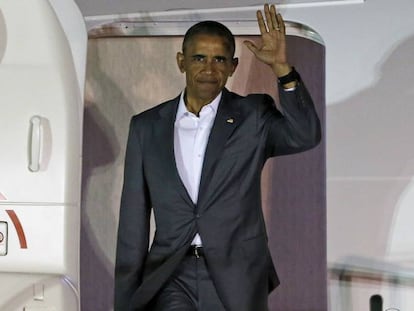Brexit forces US to seek new special ally in Europe
Washington is about to lose the best champion of its own interests in the European Union’s hallways of power

With six months to go before his presidency ends, Barack Obama has a new cause for concern: Europe. Britain’s decision to leave the European Union, made in a recent referendum, is altering relations between the United States and the European continent.
With the “Brexit,” as the departure is known, Washington is losing the best champion of its own interests in the European hallways of power, on matters ranging from the economy and security, to espionage.
While Obama insists that America’s “special relationship” with London will endure, Brexit will force the US to reinforce its ties with other European countries to try to retain its own influence over the continent.
France and Germany are the early favorites to replace Britain as Washington’s partner of choice. The US president will be traveling to Poland and Spain in the coming days on a tour that is sure to be marked by the referendum in Britain.
Obama will travel to Poland and Spain in the coming days on a tour that is sure to be marked by the upset referendum in Britain
Turning attention to Asia had been one of Obama’s chief foreign policy goals. During his first term in office, the European economic crisis and the Arab Spring revolts made that difficult. And during his second term, the threat of jihadism pushed him into greater involvement in the Middle East.
Now, the Brexit vote means that the US president will have to pay a lot more attention to Europe once again. And so will his successor in the White House, beginning in January of next year. The Democratic nominee, Hillary Clinton, supports maintaining US foreign policy along the same lines as Obama’s, while the Republican candidate, Donald Trump – who has applauded a Brexit – defends greater isolation for his country.
A great blow
Fiona Hill, an Englishwoman who has been living in the US for 27 years, is one of Washington’s biggest experts on transatlantic relations. As head of the US and Europe Center of the Brookings Institution, she says that the outcome of the UK referendum “is a great blow” to the US and Europe alike.
“No doubt, the United Kingdom was viewed by the US as a kind of anchor in the relationship, because of their common perspective on a wide range of political, economic and security matters,” she said.
Sign up for our newsletter
EL PAÍS English Edition has launched a weekly newsletter. Sign up today to receive a selection of our best stories in your inbox every Saturday morning. For full details about how to subscribe, click here.
Britain is a key element in the institutional architecture built by the US and Europe after World War II. There is hardly a global initiative introduced by Washington that London has not been the first to subscribe to. The British exit from the EU does not necessarily have to change that, but it could condition transatlantic relations at a time of enormous challenges that include NATO’s response to Russia’s expansionist ambitions, talks for a free trade agreement between the EU and the US, and global cooperation to fight the jihadist threat.
The Obama administration has admitted that it was not expecting Leave to win on June 23. The US president had campaigned in favor of Remain. His reaction to the outcome has combined a call to caution and a dose of realism. Obama has asked Europe and Britain to negotiate an orderly transition, underscoring that Brexit will not change existing cultural and economic ties between both nations, nor will it end their cooperation in world affairs as members of NATO and the United Nations Security Council.

Yet even Obama has admitted that he is concerned that Britain’s absence from the EU, coupled with potential alterations within Europe, could make it difficult to find solutions to other existing challenges.
Meanwhile, Brookings expert Fiona Hill is recommending that Washington try to diversify its alliances on the old continent. She feels that the US should, on one hand, try to help Britain and the EU build bridges, and on the other hand, intensify its own relations with France and Germany, but also with other regional powers such as Spain and Italy.
But Hill thinks it will be difficult for Washington to find a short-term ally that can match Britain on matters of espionage. The UK is one of four English-speaking countries that the US partners with on the Five Eyes alliance. Following the 2013 espionage scandal involving German chancellor Angela Merkel and disclosed by former NSA contractor Edward Snowden, the US offered Germany increased intelligence cooperation, but the response was lukewarm. Berlin is also more reticent to embark on military adventures than London or Paris.
Carles Castelló-Catchot, a Spaniard who works as chief of staff at the Brent Scrowcroft Center of the Atlantic Council, a Washington think tank, believes that France and Germany will become America’s preferred links to the EU, in Britain’s absence.
“I just don’t see the secondary powers [playing that role],” he says. “Spain has enough work to do at the domestic level, Italy is still emerging from a political and economic crisis, the Eastern European countries have enough on their hands with Russia, and the Scandinavian countries are less involved.”
In recent years, Obama has not hesitated to dial Angela Merkel’s number in Berlin to discuss major European issues. Germany was a priority partner in the management of the Greek and Ukrainian crises, as well as European reform. And France has become a key ally in the fight against terrorism.
A waning influence?
But the question is whether Washington could ever carry as much clout with Berlin and Paris as it does with London, which shares similar views on economic liberalism and military interventionism.
It is also unclear how the London-Washington relationship will change following the exit from the EU.
“It is evident that they will stop being priority allies on EU issues. Whether you like it or not, one, two, five years from now, if it’s the Germans and the French that you are talking to the most because they’re really the ones who can help you on international security and economic integration issues, then you start losing human relations, diplomatic contacts,” says Castelló-Catchot. “If a Brexit takes place, that special relationship gets a bit eroded, because it stops having an instrumental meaning. We will see whether historical and security ties are enough to keep it alive.”
English version by Susana Urra.
Tu suscripción se está usando en otro dispositivo
¿Quieres añadir otro usuario a tu suscripción?
Si continúas leyendo en este dispositivo, no se podrá leer en el otro.
FlechaTu suscripción se está usando en otro dispositivo y solo puedes acceder a EL PAÍS desde un dispositivo a la vez.
Si quieres compartir tu cuenta, cambia tu suscripción a la modalidad Premium, así podrás añadir otro usuario. Cada uno accederá con su propia cuenta de email, lo que os permitirá personalizar vuestra experiencia en EL PAÍS.
En el caso de no saber quién está usando tu cuenta, te recomendamos cambiar tu contraseña aquí.
Si decides continuar compartiendo tu cuenta, este mensaje se mostrará en tu dispositivo y en el de la otra persona que está usando tu cuenta de forma indefinida, afectando a tu experiencia de lectura. Puedes consultar aquí los términos y condiciones de la suscripción digital.









































